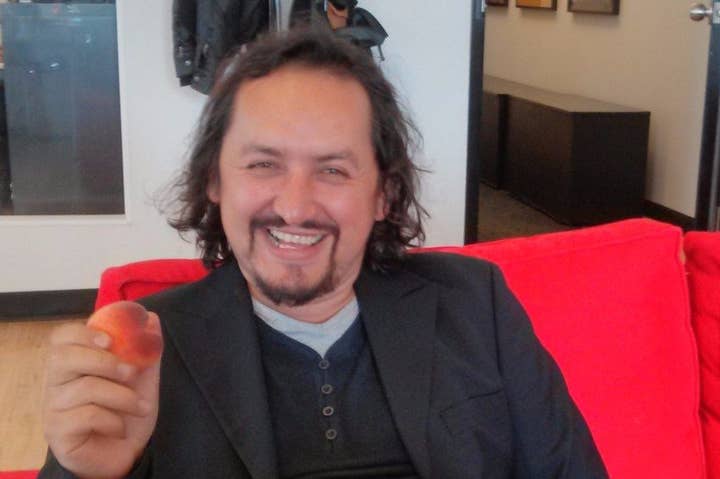"I don't believe the killer app for VR is going to be shooting"
Papo & Yo developer Vander Caballero says he's betting it all on virtual reality, starting with Time Machine
At first glance, Minority Media's upcoming Time Machine seems like a radical departure for the Montreal-based studio. The virtual reality action game casts players as a scientist travelling back in time to observe and record biological data of an assortment of dangerous prehistoric creatures. Tonally, it's a far cry from Minority's 2012 debut, Papo & Yo, a critically acclaimed "empathy game" about a child coming to terms with his father's alcoholism.
But for Minority Media creative director Vander Caballero, Time Machine feels more like coming home than striking out into new territory. As Caballero explained to GamesIndustry.biz at the Game Developers Conference earlier this month, his first job out of school 15 years ago was working with VR. He might have stayed in the field, too, if he hadn't noticed that the technology was essentially stagnant at the time, while the virtual worlds depicted in video games seemed to be evolving far faster. But when Oculus Kickstarted both the Rift headset and a renaissance in VR interest in late 2012, that no longer seemed to be true, and Caballero's interest was piqued. When he got a Rift dev kit, he was committed.
"We were like, 'Wow, this is it.' This is the future. Then we decided to bet it all on VR."
"We were like, 'Wow, this is it.' This is the future," Caballero said. "Then we decided to bet it all on VR. And then we made a lot of experiments with VR and after a lot of experimentation, we decided not to go with empathy games at the beginning. We're going to do one, and we have one already in the process, but we're going to start with a game that really takes advantage of the technology."
For Caballero, that means a game that can instill in players the sense of wonder and fascination he had with nature documentaries growing up. Of course, in nature documentaries, you never see the animals attack the people holding the cameras. In Time Machine, players must plan out a strategy allowing them to get close enough to scan creatures without creating a paradox (getting killed and leaving a futuristic corpse back in prehistory).
"It was so rewarding," Caballero said of the first time trying the idea out in VR. "All your senses were immersed by it and suddenly when you finish the experience, you take off the helmet and you go, 'Wow, that was heavy!' And you didn't shoot anyone. You didn't hurt anyone."
That's a key point for Caballero. Every platform has a different affordance, he said, and certain genres and experiences that work well. Traditional consoles and PCs with a keyboard-and-mouse setup work well for first-person shooters, he said, but the experience doesn't translate well to mobile devices or something like the Wii. The first-person shooter genre is a similarly ill fit for VR, Caballero said, because movements like going backwards, circle-strafing, or ascending stairs at high speed can quickly trigger motion sickness.
"I don't believe the killer app for VR is going to be shooting," Caballero said. "And that is an amazing step forward, an opportunity for all of us."
"Someone can go through a really bad demo and say VR is bad. No, it's not. It's just a bad demo..."
Caballero might be happy to see the threat of motion sickness pushing people to not rely on the same old genres in VR, but he understands it's a tremendous obstacle to the success of the technology.
"My biggest concern is that people aren't able to differentiate between the tendency to get motion sickness from a bad product," Caballero said. "Someone can go through a really bad demo and say VR is bad. No, it's not. It's just a bad demo if you don't keep the frame rate stable or you make people do really stupid stuff for example, like you make a first-person shooter."
Time Machine also marks a move away from the mobile space for Minority. Caballero said that after Papo & Yo, there was lots of pressure to make games for the exploding mobile scene. Minority made a pair of premium titles--Loco Motors and another empathy game, Spirits of Spring--which Caballero described as fun to make, but also "really, really painful." The games got great reviews, and Loco Motors in particular received plenty of featured placement on digital storefronts, but the games just didn't take off.
"If we came out with [Loco Motors] two years before, it would have been crazy," Caballero said. "That's a thing about this constant technological wave: You can arrive with something amazing, but if you arrive late, [shrugs]. That's another reason we don't want to miss the VR wave. We want to be there at the beginning."

